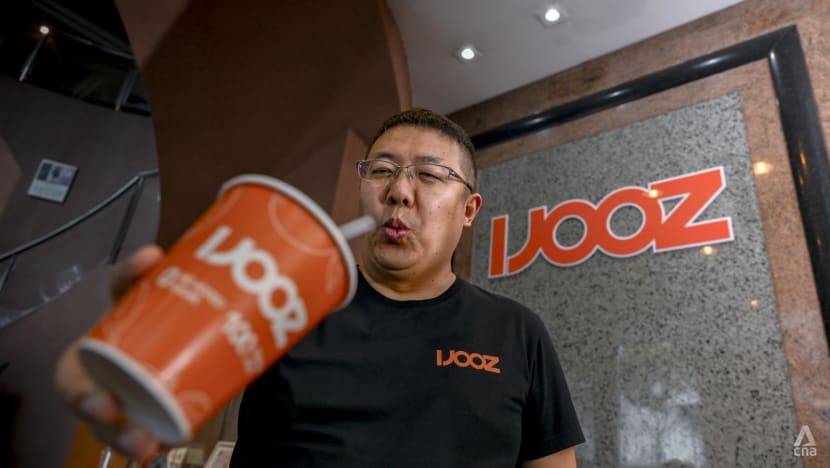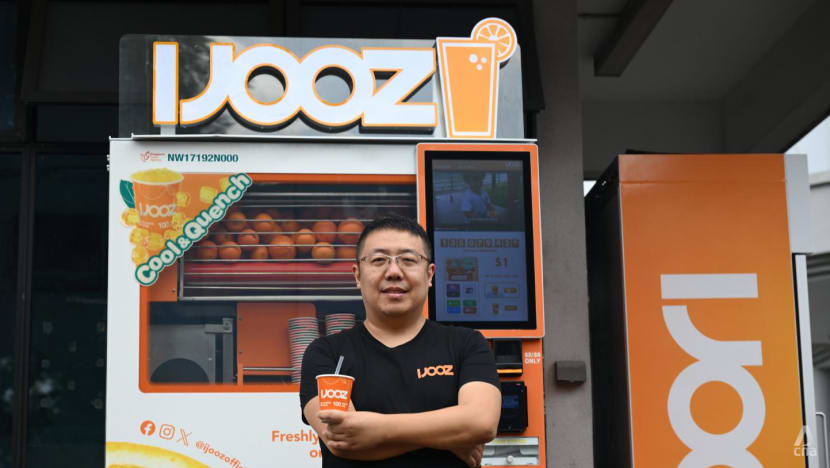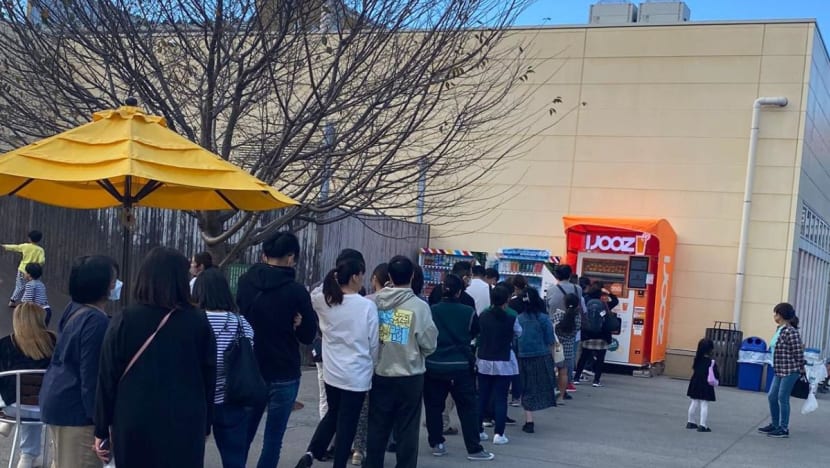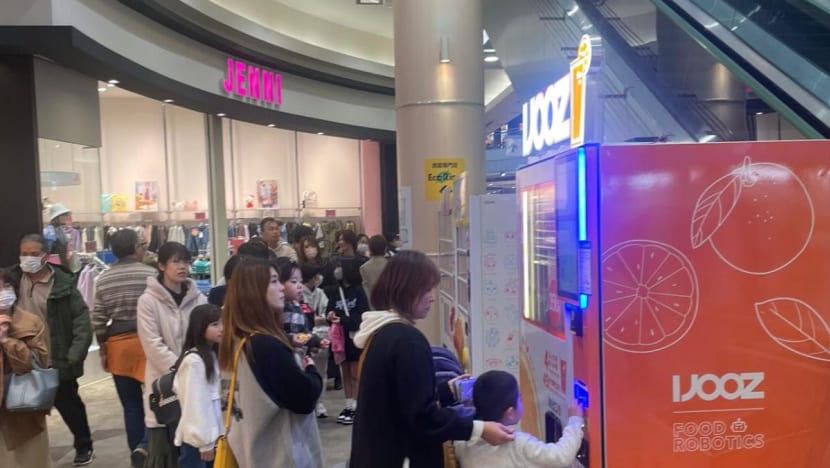From Singapore to the world: iJooz CEO on revolutionising orange juice
Why is the freshly squeezed orange juice at some iJooz machines priced at S$2 but S$3 at others? CEO and founder Bruce Zhang tells us the answer.

CEO and founder of iJooz Bruce Zhang at the company's Singapore office on Jan 3, 2025. (Photo: CNA/Wallace Woon)

This audio is generated by an AI tool.
SINGAPORE: What goes into a S$2 cup of freshly squeezed orange juice? Much more than one might think, according to iJooz CEO and founder Bruce Zhang.
The simple answer is four oranges – a fact proudly displayed on every iJooz vending machine. These machines feature wide glass panels, allowing curious customers to watch the process in action.
But those few seconds of juicing are just the tip of the iceberg in a meticulously engineered supply chain.
Supplying tens of thousands of orange juice cups daily in Singapore – and ensuring that each and every cup is fresh and tasty – requires precision, innovation and years of refinement.
Before founding iJooz, Mr Zhang worked in the semiconductor industry for 12 years, where he honed his expertise in robotics and data analytics.
This background inspired his vision to solve the labour and cost challenges that retail often faces. When it comes to juice, traditional stalls face high costs for procurement, labour and rent.
“There’s demand for fresh juice, but it’s difficult to find and it’s not cheap,” the 42-year-old said.
“I thought about whether we could overcome that to make sure the orange juice we sold would be easily accessible, convenient and cheap,” he told CNA at the iJooz office in the Yishun industrial area.
APPEALING PRICE POINT
Mr Zhang is adamant that iJooz is not a juice retailer, but a technology company. The robots that squeeze the oranges, the data crunching that enables the smooth refilling of the machines and even the monitoring systems that can predict when something needs to be fixed are what allow the firm to keep prices low, he said.
Its vending machines are powered by in-house software and hardware, and the company is pressing on with research and development to improve them, said Mr Zhang with a tinge of pride. Its fifth-generation machines even offer an option to add ice, a recent innovation available on about 20 machines out of 1,500 islandwide.
Since iJooz’s first vending machines hit the streets in 2016, the price per cup has stayed at S$2 at most locations.
Certain machines charge S$3 a cup, usually due to requirements from landlords, and there are 40 to 50 such machines islandwide, he said.
However, customers using the iJooz mobile app enjoy a consistent S$2 price everywhere. Launched in November 2024, the app already accounts for 10 per cent of sales.
A juice lover, this reporter was intrigued at how iJooz cups always seem to be sweet, even at the times of year when most oranges sold at markets are sour. The company sources its oranges from all over the world and tracks which farms produce oranges that meet its standards at different times of the year, sometimes down to specific weeks, Mr Zhang explained.
It uses data analytics to decide how many oranges to procure from where and when, depending on the time of the year. How the machines are refilled is also dynamic – drivers receive instructions on the exact quantity of oranges to replenish and the most efficient routes between machines.
For those concerned about cleanliness, the entire machine is effectively a refrigerator, keeping an internal temperature of 4 degrees Celsius, said Mr Zhang.
The motors that come into contact with juice are changed every time the machines are refilled, and sent back for cleaning, he added, likening the process to how a central kitchen operates.
RIPENING BUSINESS
If you think you've noticed more iJooz machines popping up on the streets recently, you'd be right – the company is adding about 100 machines each month.
They can now be found in schools, at MRT stations, below office buildings, at shopping centres, in the heartlands, at tourist attractions and so on. The company is licensed under the Singapore Food Agency, and has to register each machine with the government.
Despite recent growth, success was slow in the early years. Between 2016 and 2017, the company operated just over 20 machines here, and mostly focused on research and development.
Early customer validation came when Mr Zhang observed an elderly couple effortlessly buying juice at Tampines MRT station. “Even someone who’s 90 years old can buy it. It’s not complicated; it’s simple and idiot-proof. This is what we did right,” he said.

The brand has also expanded internationally, starting in 2019 with franchises in over 30 countries. While growth paused during the pandemic, iJooz emerged stronger, focusing its recent efforts on Japan. There, it operates 1,300 machines in cities like Tokyo, Osaka, and Nagoya, where fresh juice is a rarity due to high fruit costs.
But growth hit a standstill from 2020 to 2022 as the pandemic slowed the world down. “Before COVID-19, there were other companies trying to do the same thing with orange juice, but after the pandemic, we were the only ones left,” said Mr Zhang.
He decided to expand the business to Japan in 2023, and has spent most of the past year there. It now has about 1,300 machines in Tokyo, Osaka, Nagoya and Fukuoka.
“Actually, we’ve been growing at the rate we want to grow at because we don’t really have competitors. It’s a blank slate market,” he said.
“We want to manage our growth because if we just suddenly set up many more new machines, the rest of our processes will have to play catch up.”
Throughout December 2024, he received messages every day from friends and acquaintances who visited Japan and were surprised to see the machines and snaking queues in front of them.
“I haven’t seen a single shop that sells fresh juice in Japan. Fruits there are so expensive, they can’t bear to turn it into juice,” Mr Zhang said.
In the past two years, iJooz has inked deals with household names like Don Don Donki and the Japan Railway group of companies. The team is currently in talks with possible investors in Japan and Singapore.
In Japan, a cup of iJooz costs 350 yen, or about S$3.



Next on his agenda is to break into the US market, starting with New York this year. He hopes to replicate the success of Singapore and Japan, which will keep the company on schedule for an initial public offering (IPO) in the United States by 2027.
While the Singapore market is smaller than Japan and the US, he stressed that he still considers iJooz a homegrown company, and about 160 of his 500 employees are based here. The rest are based in Japan and China.
“Even if we max out the market in Singapore, we’d still be considered a small company in the US. That's why we are aiming to IPO before we keep expanding there.”
Like many other things, the price of oranges has shot up significantly in the past few years, Mr Zhang said, swiping through charts on his phone that show the inflation over time.
Will he commit to keeping the S$2 price tag? “I don’t dare to promise that. But we’ll try our best to make sure Singaporeans can get their drinks at S$2.”














